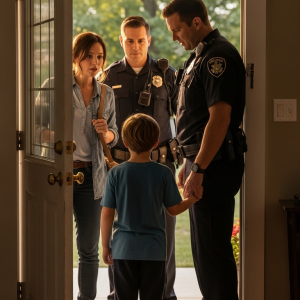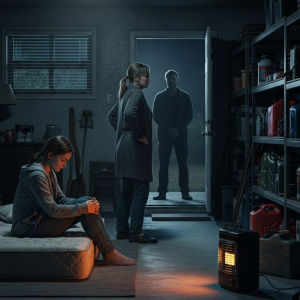For my daughter’s eighth birthday, my parents sent her a pink dress as a gift. She seemed happy at first, her eyes wide with excitement, but then she froze, the smile slipping from her face. “What is this, Mommy?” she whispered. I looked closer, and a cold dread washed over me as my own hands started to shake. I didn’t cry. I just acted. The next morning, my parents were calling my phone non-stop.
It showed up on a Thursday, a simple brown box, slightly crushed on one corner. Maya’s name was written across the label in my mother’s handwriting—the careful, slanted kind she only uses for packages and passive-aggressive Christmas cards. At the time, I thought nothing of it. Just a late birthday gift, no big deal.
I brought it inside and set it on the kitchen table amidst the usual chaos of leftover cereal bowls and a half-colored unicorn drawing. Maya saw it and her face lit up. She loves mail. You could wrap a rock in tissue paper and she’d still thank you like you’d just paid off her student loans. She was wearing mismatched socks and had a smudge of toothpaste on her chin. “Open it,” I told her.
So she did. Inside one layer of white tissue paper, neatly folded—classic Mom—was the dress. She peeled back the paper and gasped. “It’s a dress!” she said, holding it up. It was pink, made of a soft material, with little embroidered stars near the hem. It looked like something you’d wear to a fairy-tale-themed brunch or a third-grade piano recital. Not my style, but Maya beamed like it was the greatest thing she’d ever seen.
“Fancy,” my husband said, glancing up from his laptop. “She’ll grow out of it in a month.” I said it with a smile, but my words were tinged with a familiar weariness.
Maya twirled, the hem of the dress spinning out in a soft circle. I almost said it was sweet, but then she stopped. Not slowly, not dramatically, just… a dead stop. She stared at the front of the dress, her little eyebrows pulled together in confusion. “Mommy,” she said again, her voice smaller this time. “What is this?”
I stood up and crossed the room. She turned the dress around so I could see, and that was the moment. That was the moment everything inside me started to rattle. It was a small, delicate white thread, stitched in tidy cursive, centered just above the chest. Little Emily. My own hands began to tremble before my brain even fully registered what I was looking at.
“What’s wrong?” Maya asked, her voice quiet and uncertain.
My husband came over, squinting at the dress. “That’s weird. Maybe they meant to personalize it and got the name wrong? Is it a mistake?”
“Did they think I was someone else?” Maya asked, looking up at me, her eyes wide with questions. “Who’s Emily?”
I didn’t answer her. Not out loud. Because the first rule of my childhood echoed in my head: We don’t talk about Emily in this house. Not because we can’t, but because we know better.
“I don’t mind,” Maya said, her voice still small. “It’s still pretty. I can wear it even if the name is wrong.”
“No,” I said, my voice firmer than I intended. “You’re not putting it on.”
“But it’s fine—”
“You’re not wearing it.” I took the dress from her, not roughly, but with a finality that left no room for argument. I walked into the bedroom and shut the door, leaving my confused daughter and bewildered husband in the kitchen.
I sat on the edge of the bed, the dress draped across my hands. My fingers shook so hard the delicate fabric rippled. It wasn’t the same dress, but it was a ghost. It was the same color, the same collar, the same embroidered stars. They hadn’t just found this somewhere; they had it made. They had stitched her name onto it, as if that were a normal, kind thing to do.
My breathing went shallow, that tight-chested feeling you get when the air in a room suddenly feels too thick to breathe. My husband eventually knocked on the door. He didn’t try to come in. He just asked if I was okay, if I wanted to talk. “I just need a minute,” I said, my voice sounding distant even to my own ears.
I needed much more than a minute. I needed a time machine. I needed a family that didn’t use memories as weapons. I needed to understand how, after all these years, they could still get it so catastrophically wrong. The dress wasn’t just a dress; it was a message, a carefully crafted grenade lobbed straight into the heart of the fragile peace I had built for my own family.
The name on the dress was Emily. My older sister. The one we were never allowed to talk about. The one who had passed away when I was six and she was eight. It was the dress she was supposed to wear to her first dance recital, a dress my mother had sewn herself. A dress she was buried in.
And they had recreated it for my daughter.
I stood there, staring at the tiny cursive letters, and I could see it all. I saw the look on my mother’s face when she saw the original dress, the pride that softened her usual sharp features. I saw my father holding up the camera, telling Emily to smile. I saw the way the light caught the little stars on the fabric. And I saw myself, a little girl sitting on the floor, watching, always watching, learning the silent rules of a house where love was conditional and grief was a secret.
My parents had never processed her passing. Instead, they had packed her away, her name becoming a forbidden word. Any mention of her was met with a sharp glance or a sudden change of subject. They thought if they didn’t speak of the loss, it would disappear. But it didn’t disappear. It festered. It became a ghost that haunted every holiday, every milestone, every quiet moment.
And now, they had handed that ghost to my daughter. They hadn’t just given her a dress; they had given her a role to play, a shadow to live in. They weren’t seeing Maya. They were trying to resurrect Emily.
I finally understood. My entire life, I had been the replacement child, the one who was supposed to fill the void but could never quite get the shape right. I wasn’t as bright, not as graceful, not as… Emily. And now they were trying to do the same thing to Maya. The thought didn’t just hurt; it clarified everything. The endless comparisons, the subtle disappointments, the feeling that I was always being measured against a memory I wasn’t allowed to acknowledge.
I took a deep, steadying breath. I walked back into the living room. My husband was sitting on the couch, Maya curled up beside him, quietly drawing in her notepad. He looked up at me, his eyes full of concern.
“Are you okay?” he asked softly.
“No,” I said. “But I’m about to be.”
I picked up my phone. I didn’t call them. Not yet. I knew what would happen. They would deny, deflect, and tell me I was being overly sensitive, that I was the one making it weird. Instead, I opened my banking app, the one I used to manage the automatic transfers to my parents’ account. The money for their bills, their groceries, the financial cushion I’d been providing for years.
I canceled the mortgage payment first. Then the utilities. Then the standing transfer for “general expenses.” With each tap of the screen, I felt a weight lift. The weight of expectation, of unspoken duty, of trying to earn the love of people who were incapable of giving it freely. The screen was blank. The accounts were delinked. The silence in the house felt different now. It wasn’t the heavy silence of secrets. It was clean. It was peace.
The first call came at 9:07 the next morning. It was my mother. I let it go to voicemail. Then another at 9:15. By 11:00, I had six missed calls and two frantic messages.
“Sarah, what’s going on? The mortgage payment didn’t go through. Is everything alright? You need to call me back immediately.” The second one was just her saying my name over and over, her voice rising in panic.
The texts from my dad started in the afternoon. “Your mother is very worried. You’re not answering. If something is wrong, you need to tell us.” I didn’t reply. I knew what they wanted. They didn’t want to know if I was okay; they wanted to know if their financial support was okay.
Finally, that evening, my sister called. The one who lived across the country, the one who only ever called when she needed something.
“Mom told me what happened with the dress,” she said, no hello, no preamble. “I get that you’re upset, but you can’t just cut them off. They depend on you.”
“They made a replica of our dead sister’s burial dress and gave it to my eight-year-old daughter for her birthday,” I said, my voice flat. “And you’re worried about their finances?”
There was a pause. “It’s just… it’s a complicated situation, you know that.”
“No, it’s not complicated anymore,” I said. “I’m done. I’m done being the dependable one. I’m done being the one who cleans up the messes while everyone else pretends to be the victim.”
I hung up before she could respond. I blocked her number, then my parents’ numbers. For the first time in my life, my phone was silent. The quiet was terrifying. And then, it was freeing. That night, I didn’t sleep on the couch. I went to my own bed and lay beside my husband, my daughter sleeping peacefully in the next room, and for the first time in years, I felt like I was truly home.
That peace, I soon learned, was only the eye of the storm. My family, having operated on a formula of passive aggression and guilt for decades, didn’t know how to handle silence. It was a language they didn’t speak. When their calls and texts went unanswered, they escalated. I thought blocking their numbers was a fortress wall; it turned out to be merely a picket fence they were more than willing to trample.
The first volley was a series of emails with subject lines like “Urgent Family Matter” and “Your Mother is Worried Sick.” I created a filter that sent them directly to a folder I named “The Void.” Then came the voicemails on my husband’s phone. He played one for me one evening, his jaw tight with anger on my behalf.
It was my mother’s voice, not frantic anymore, but laced with a cold, practiced disappointment. “Mark, I know you’re there. I assume Sarah is refusing to speak to us. I just hope you understand what she’s doing. She’s punishing us for a gift that came from a place of love. A way to… to keep Emily’s memory alive. Sarah was always so sensitive, so dramatic. I hope for Maya’s sake you can talk some sense into her. A family shouldn’t fall apart over a piece of cloth.”
A piece of cloth. She had reduced my childhood trauma, my sister’s memory, and my daughter’s well-being to a piece of cloth. Mark switched off the phone, his expression grim. “That’s it,” he said. “I’m blocking them too. This isn’t just about you anymore, Sarah. This is about our family. The one we’re building here. And in our family, we don’t use people as memorial sites.”
His words were a balm. For so long, I had navigated my family’s dysfunction alone, convinced that it was my burden to carry. Hearing him so fiercely protective of our shared peace, of Maya’s innocence, solidified something in me. This wasn’t just me running away; it was me running towards something better.
A few days later, the inevitable happened. I was in the kitchen making Maya an after-school snack when she walked in, clutching the brown paper bag from the porch. I had put it in the garage, intending to deal with it later, but she had found it. She didn’t take the dress out. She just held the bag, her expression serious and thoughtful.
“Mommy,” she said, her voice small. “Who was Emily?”
I took a deep breath. The cycle of silence, the one that had suffocated my family for over twenty years, had just presented me with a choice. I could continue it, tell her it wasn’t important, and teach her that some feelings are too dangerous to discuss. Or I could break it.
I sat down at the table and patted the chair next to me. “Come here, sweetie.” She sat, placing the bag between us like a centerpiece. “Emily was my big sister,” I began, my voice steadier than I expected. “That means she would have been your aunt.”
Maya’s eyes widened. “I have another aunt?”
“You did. She passed away when she was very little, even younger than you are now. She was funny and bright, and she loved to dance more than anything. That dress…” I paused, choosing my words carefully. “That dress was very special to her, and to Grandma. It holds a lot of memories for them.”
“So they gave it to me?” Maya asked, a little line of confusion between her brows.
“Sometimes, when people miss someone a lot, they try to hold on to things that remind them of that person,” I explained. “And sometimes, they get so focused on the memory that they forget to see the wonderful person standing right in front of them. It wasn’t about you, honey. It was about them. And that’s not fair to you. You are not a memory. You are Maya.”
She seemed to mull this over, her gaze distant. “Is that why you were sad?”
“Yes,” I admitted. “It was a sad memory. But it’s okay to be sad. It’s not okay to make someone else carry your sadness for you. Do you understand?”
She nodded slowly, then pushed the bag across the table towards me. “I don’t think I want it anymore,” she said. “It’s pretty, but it’s not my memory.” In that moment, my eight-year-old daughter showed more emotional intelligence than my parents had in their entire lives.
The final confrontation happened the following Saturday. The doorbell rang, and through the peephole, I saw them both, standing on my porch like grim-faced solicitors of guilt. My father held a box of pastries, the classic peace offering that was never accompanied by an actual apology.
I opened the door just a crack. Mark stood behind me, a silent, solid presence. “We’re not doing this,” I said, my voice leaving no room for negotiation.
“Sarah, please,” my mother started, her eyes already welling up. “We just want to talk. We brought your favorites.”
I didn’t even look at the box. I stepped back inside for a moment and returned with the brown paper bag. I held it out to her. “This is yours. You need to keep it. But what you can’t keep is us. Not like this.”
My father finally spoke, his voice strained. “Your mother… we didn’t mean any harm. We just miss her so much.”
“I know,” I said, and for the first time, a pang of genuine empathy cut through my anger. “But you cannot use my daughter to fill the hole that Emily left. That is a weight no child should ever have to carry. We need space. Real space. Don’t call, don’t email, don’t come here again. When we’re ready, if we’re ever ready, I will be the one to reach out.”
My mother looked utterly stunned, as if the idea that she couldn’t control the narrative was a concept she’d never encountered. She opened her mouth, then closed it again. She took the bag from my hand, her knuckles white.
I closed the door gently and locked it. I leaned against it, my heart pounding, and listened as their footsteps retreated down the path. Mark wrapped his arms around me from behind. I didn’t cry. The time for tears was over. Through the living room window, I saw Maya, sitting on the floor, happily drawing a new unicorn, this one with giant, sparkling wings, ready to fly wherever she wanted. And I knew I had made the right choice.




